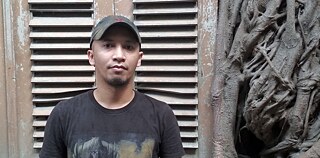Conversation and Discussion
Lecture

Sun, 07.10.2018 2:00 PM - 9:00 PM
Kedai Kebun Forum
Details
Language: English, IndonesianPrice: Free and open to the public
+62 21 23550208-116
Maya.maya@goethe.de
Kedai Kebun Forum
14.00- 15.30
Interlacing Perspectives – Things Learned Through Networking
Speakers: Wok the Rock (Yes No Klub), Tengal & Erick Calilan (WSK Festival), Yuen Chee Wai (Playfreely/BlackKaji & Asian Meeting Festival), Jan Rohlf (CTM Festival & ICAS Network)
Moderator: Anna-Maria Strauß (Goethe-Institut Indonesien)
Networks and collaborative models are touted as crucial tools for an unknown future. As networks spread ever more globally and encompass more hybrid artistic disciplines and voices, questions on how to truly work together take on more complex dimensions. What are the challenges of working transculturally and in a truly mutual way? To what extent can everyone’s voice be heard without paralysing decision-making processes? How do we address global asymmetries? Are there any best practice examples already out there?
The session will begin with short presentations by each of the four organisations behind Nusasonic, giving information on their context and activities. The presentations will be followed by a discussion about the processes (development, curation, communication, logistics) behind Nusasonic, exploring some of the challenges in working together and lessons learned in creating Nusasonic, and posing questions for future endeavours.
15.30-16.00
Break
16.00–17.00
The Cyborg in the River: Sewing Machines to the Ethnic Body
Lecture by Tad Ermitaño
Outside of their cultures of origin, technologies are always first encountered as imported alien artifacts. The wholesale importation of technologies is generally a consequence of economic imperialism, and inevitably delivers cultural shocks to the recipient. These shocks call forth a variety of responses, some of which contradict each other and whose interplay has various and unforeseen historical consequences. The interaction of art forms founded on electronic technologies with concepts of national identity provides an interesting window into the processes by which the Alien is digested and absorbed into the body of a culture.
This talk is given by Tad Ermitaño, a key pioneering figure in new media art in the Philippines and Southeast Asia. His artistic practice encompasses a remarkable examination of the processes, semiotics, and structures surrounding man’s relationship with machines.
17.00–18.00
Self-organising Structures and Maker Culture
Speakers: Andreas Siagian (Lifepatch), Peter Kirn (CDM), Arnont Nongyao, Lintang Raditya, Yab Sarpote (AOA Space)
Moderator: Tengal (WSK)
Artistic labs, maker culture, DIY, DIWO, tinkering… a plethora of terms are used to describe the global phenomenon of do-it-yourself cultures. Though DIY artistic practice exists worldwide, some cities or regions harbour a reputation as hotspots; Indonesia and Southeast Asia stand out for their strong collaborative ethic, and Berlin is likewise known as a hub of makers, hackers, and collectives. What common inspirations and strategies are shared among these locations? Are there differences in how and why they’ve come to be? Are these communities equally affected by an increase in competitive mindset, and how, if at all, do they try and combat it? What can they learn from each other? In this talk, different artists and makers bring their experiences to the table, give perspective on their local scenes, and suggest how their knowledge might connect across geographies.
18.00-19.00
Break
19.00-20.30
Music and Politics Through Raja Kirik
A conversation with Yennu Ariendra and J Mo’ong Santoso Pribadi
Moderator: Gunawan Maryanto
The album Raja Kirik (The Dog King) engages with the history of violence in East Java during the Dutch occupation. The album consists of six compositions that encompass the story of the fictionalized king Menak Jinggo from the ancient manuscript Serat Damar Wulan, and Jathilan art with a focus on Jaranan Buto. Further inspirations from Jathilan art forms such as Gedruk Merapi and other variations from Yogyakarta, Bantul, and Purwokerto can also be heard.
Raja Kirik takes a first-person narrative approach, with the Dog King as its main protagonist. In the words of this talk’s moderator, Gunawan Maryanto: “For me, Raja Kirik can be anyone today: those who are marginalised, oppressed, and always denied.” The album is part of a long-term research project titled Menara Ingatan. It serves as the base for Ariendra and Pribadi’s performance at Societet Militer on 10 October.